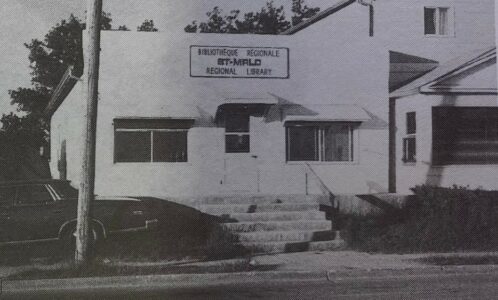
Original location of the St-Malo Branch at the residence of Albert & Therese Morin
Tireless work began in 1961 when members of the community petitioned the RM of DeSalaberry to establish a library. Mr. Rene Prefontaine championed the advantages of establishing a Regional Library in conjunction with the Village de St-Pierre-Jolys. On November 12, 1961 both the Village St-Pierre-Jolys & the RM of DeSalaberry enacted the Establishment By-Laws per the “1954 Public Libraries Act”. The Bibliothèque Régionale Jolys Regional Library (JRL) was the first Bilingual Regional Library established in Manitoba.
On February 14, 1962 the very first Board Meeting was held. Mr. Rene Prefontaine voluntarily offered his services to strengthen the library delegation to the Provincial Library.
The following were in attendance:
• Elected Library Board Chairman – Mr. Fernand Lavergne (St-Pierre-Jolys)
• Temporary Secretary – Mrs. Leontine Tessier (St-Pierre-Jolys)
• Elizabeth Grant (Otterburne)
• Fernand Berard (RM of DeSalaberry)
• Wilfred Gosselin (St-Malo)
• Rene Prefontaine

Miss Cecile Berard was the first Librarian hired in April of 1962.
Many hours of preparation and work were put in to prepare for the Official Grand-Opening in St-Pierre-Jolys on April 7, 1963. The Library was situated at the “Ma Dame” building owed by the Dotremonts. Following was the opening of the St-Malo Branch at the residence of Albert & Therese Morin, as well as the Otterburne branch located at the old school. By the end of the first year the JRL collection totaled 3500 books, %75 of its collection was French material.
By 1967 the Main branch was moved to the St-Pierre-Collegiate. Our partnership is the oldest example of a school-housed public library in Manitoba. JRL was also the first to establish a bilingual book exchange with St-Rose du Lake & Transcona Libraries.
After operating for 12 years the branch in Otterburne closed along with the school.
Through out the years many programs and services have been offered. In 1979 the very first Story hour has held, and has remained a very important program offered to the little ones of the community. With the demolition of the old Church situated in St-Pierre-Jolys, the parishioners needed a temporary local, thankfully the Library was able to assist until the construction of the new church was finished.

The St-Malo Branch moved a few times, from Mr.Morins’ to Rosaire & Lea Marcoux to the Chalet Malouin until its present location at Ecole St-Malo School.
Throughout the last 60 year the library has had to develop and change to accommodate its patrons as well as adapt to the industry standards. The ‘90s saw huge enhancement with use of computers and the introduction of the internet. The entire collection was transformed in 1994 to an Automation Catalogue System. This would have been a huge undertaking as at that point JRL had over 28000 books. Prior to this all library books were manually catalogued using the Card Catalogue System, which was very time consuming & labour intensive. In 1996 Public Computers and access to the internet was a welcomed advancement for the patrons.
For 60 years JRL has strived to better serve the members of the community. In 2020 with the onset of the COVID-19 pandemic, we implemented even more services, such as Virtual Library Services for Seniors as well as Curb Side pickup.

It is with informed citizens; that people can better achieve enrichment and fulfillment through the use of available information and knowledge; and that the public library is the focal point in the community for both formal and informal association and ideas.
We strive to provide materials and services to the individual citizen, to community organizations, to governmental and social agencies, and to business and industry. Its resources and services must be available to the entire population regardless of age, sex, or physical condition; regardless of economic, ethnic, religious, or political status. Its services must be available in both official languages, French and English. As a public service institution, the Library must adapt to change to regain a relevant role in society. Its services must assist people in adapting to constantly evolving situations in their lives.
